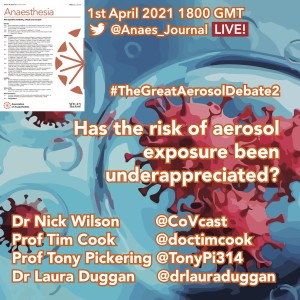
80.4K
Downloads
79
Episodes
Anaesthesia is the official journal of the Association of Anaesthetists and is international in scope and comprehensive in coverage. It publishes original, peer-reviewed articles on all aspects of general and regional anaesthesia, intensive care and pain therapy, including research on equipment. Rapid Sequence podcasts offer an insight into our journal, publications, editors, reviewers, authors and readers. Each episode is short, concise and packed full of CPD for all your educational needs.
Episodes

Sunday Apr 04, 2021
The Great Aerosol Debate 2!
Sunday Apr 04, 2021
Sunday Apr 04, 2021
There is much debate over the role of respiratory particles in guidelines for preventing transmission of COVID-19. Larger particles are traditionally called ‘droplets’ and are deemed to travel only 1-2 metres from an infected patient before falling to the ground. Aerosols are smaller particles and stay floating in the air for prolonged periods, spread further, may accumulate in poorly ventilated spaces, can be inhaled deep into the lungs and bypass looser fitting facemasks. Much current guidance is designed to protect from droplets and infection spread by aerosols is only considered a risk when caused by medical therapies. In this new study, the volunteers produced up to 100 times more aerosol particles with activities such as coughing than they did during treatment with oxygen therapies.
This challenges the current guidelines which state healthcare staff looking after patients with COVID-19 who are coughing and have breathing difficulty only need PPE that protects against the larger droplets. ‘Droplet protection’ includes surgical masks but does not prevent aerosol particles passing around the edges of the masks and being inhaled. N95/FFP3 respirators which are tightfitting and filter better, block more aerosols but guidelines currently recommend these only for staff looking after patients receiving the advanced oxygen therapies.
This new study from Wilson et al. challenges the guidance that special aerosol precautions are only needed when using oxygen therapies for COVID-19 patients, and raises concerns about safety of staff and patients on hospital wards, if they are not protected from infectious aerosols. We were joined by authors Dr Nick Wilson and Professor Tim Cook, as well as expert Professor Tony Pickering and Editor Laura Duggan. The broadcast has already been viewed over 10k times!

No comments yet. Be the first to say something!